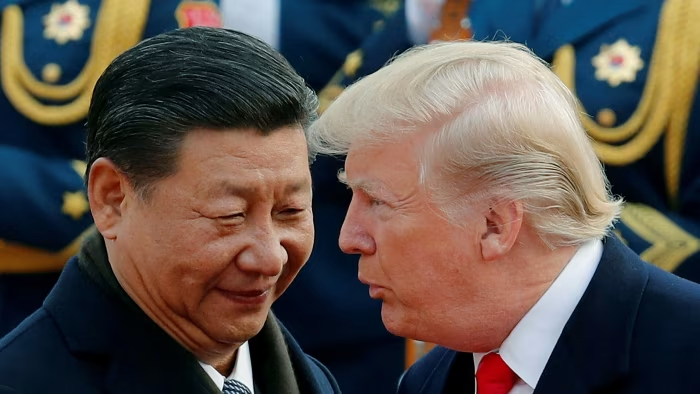
Stock Markets React to Escalating Trade Concerns Between the U.S. and China
Global financial markets recently experienced a palpable wave of uncertainty and volatility after former President Donald Trump issued statements signaling heightened trade risks between the United States and China. This development has rattled investors worldwide, triggering widespread sell-offs across key indices and highlighting the sensitive nature of geopolitical tensions on economic stability.
Markets had previously been navigating a cautious optimism, buoyed by signs of economic recovery following the disruptions caused by the COVID-19 pandemic and subsequent supply chain realignments. However, the specter of renewed trade disputes — long a source of volatility — has once again cast a shadow over this fragile optimism.
This dip in stock values was not merely a short-term market reaction but reflects deeper anxieties regarding the global economic outlook. The fear that escalating trade restrictions and tariffs could disrupt multinational supply chains and dampen growth prospects has prompted investors to reassess risk exposures. The interconnectedness of modern economies means that policy decisions or rhetoric in one region often reverberate globally, impacting currencies, commodity prices, corporate earnings, and consumer confidence
Understanding Trump’s Remarks and Their Market Impact
The root cause of the recent market turbulence lies in Donald Trump’s public comments, which suggested the possibility of reinstating or intensifying trade restrictions against China. While Trump is no longer the sitting president, his influence on market sentiment and political discourse remains significant, particularly as the U.S. approaches key election cycles.
Trump’s remarks evoked memories of the trade war during his administration (2018-2020), when tariff escalations triggered uncertainty and slowed economic activity globally. The potential for a repeat or escalation of such policies now threatens to undo much of the progress made by markets and policymakers in stabilizing trade relations.
Importantly, the current U.S. administration has taken a different approach to China compared to Trump’s era, focusing on strategic competition while seeking cooperation on global issues such as climate change and public health. Nevertheless, Trump’s statements have injected volatility into the markets, reminding investors that political dynamics remain unpredictable and can significantly influence economic trajectories.
Historical Context: U.S.-China Trade Relations and Market Volatility
To fully grasp the significance of the current situation, it is essential to reflect on the historical context of U.S.-China trade relations. Over the past two decades, China’s rapid economic ascent has reshaped global trade flows, supply chains, and investment patterns. The relationship between the world’s two largest economies has been both cooperative and contentious, marked by periods of collaboration as well as disputes over trade imbalances, intellectual property rights, market access, and technology transfers.
The 2018-2020 trade war initiated by the Trump administration was characterized by tit-for-tat tariff impositions that disrupted industries, increased costs, and created global uncertainty. Financial markets reacted strongly to announcements of tariff changes, and economic growth rates in both countries experienced moderation.
Following the signing of the Phase One trade deal in early 2020, some tensions eased, but fundamental disagreements remain unresolved. The current episode of market jitters demonstrates how quickly these underlying issues can resurface, driven by political rhetoric or shifts in strategic priorities.
Sectoral Impacts: Technology, Manufacturing, and Commodities Under Pressure
Among the most affected sectors during this recent market downturn were technology, manufacturing, and commodities — each deeply intertwined with U.S.-China trade relations.
Technology Sector: The technology industry relies heavily on integrated global supply chains with China playing a central role in manufacturing semiconductors, electronic components, and consumer devices. Any risk of increased tariffs or export restrictions threatens to disrupt these complex networks, raising costs and delaying product launches. Notable tech giants with significant Chinese operations saw their share prices decline amid investor concerns.
Manufacturing Sector: The manufacturing base in China serves as a critical node for assembling goods ranging from automobiles to apparel. Increased trade barriers could force companies to reconsider sourcing strategies, potentially leading to costlier production processes. Companies operating in this space face the dual challenge of navigating tariff uncertainties while managing inventory and logistics in a volatile environment.
Commodities: China’s role as the world’s largest consumer of commodities means that trade tensions can reverberate through global commodity markets. Prices of metals, oil, and agricultural products showed increased volatility, reflecting concerns over demand shifts. Producers and exporters in resource-rich emerging markets also face uncertainty as they await clarity on trade policies.
Economic Implications: Risks to Global Growth and Supply Chains
The ripple effects of deteriorating trade relations between the U.S. and China extend well beyond stock markets. Economic growth projections worldwide could be tempered by renewed protectionism and disruptions to supply chains.
Supply chains, already strained from pandemic-related shocks, face the risk of further fragmentation. Companies may accelerate efforts to diversify sourcing and production away from China, a trend known as “decoupling.” While this diversification could reduce risks over the long term, it entails substantial costs and transitional challenges that may impact productivity and prices in the short run.
Consumers may experience increased prices on imported goods, contributing to inflationary pressures. Businesses dependent on cross-border trade could see profits squeezed, affecting hiring and investment decisions. Emerging economies integrated into these trade networks may suffer economic slowdowns, exacerbating social and political challenges.
Global economic institutions and policymakers are closely watching these developments, aware that the stakes extend beyond bilateral relations and touch on the stability of the entire international economic system.
Investor Psychology: Navigating Fear and Opportunity
Investor behavior during periods of geopolitical tension often reflects a mix of fear and opportunism. The recent market dips reveal heightened risk aversion, as uncertainty fuels selling pressure and flight to safe assets such as government bonds, gold, and stable currencies.

However, volatility can also create buying opportunities for long-term investors who view price drops as temporary and expect eventual resolution or de-escalation. Market analysts emphasize the importance of diversification and risk management strategies during such periods, underscoring that geopolitical risks are part of the broader investment landscape.
Institutional investors, hedge funds, and sovereign wealth funds are closely analyzing trade developments to recalibrate portfolios and hedge exposures, a process that contributes to market fluctuations.
The Role of Government and Policy Responses
Governments on both sides and internationally are expected to respond proactively to mitigate risks arising from the trade rhetoric. Diplomatic channels remain open, and efforts to stabilize trade relations through negotiations, dialogues, and multilateral frameworks are ongoing.
Policymakers are aware that economic growth and job creation depend on predictable and transparent trade policies. In this context, any abrupt escalation could derail recovery efforts post-pandemic and undermine global economic stability.
Domestic policy responses may include measures to support affected industries, promote export diversification, and strengthen domestic supply chains. At the same time, governments may pursue diplomatic engagement to reduce tensions and foster cooperation on shared challenges.
Corporate Strategies: Adapting to an Uncertain Trade Environment
Businesses operating in this complex environment are adapting by reassessing supply chains, exploring new markets, and enhancing operational resilience.
Many companies are investing in technology and automation to reduce dependence on volatile labor markets. Others are seeking partnerships or joint ventures in emerging markets to diversify their customer bases and production footprints.
Risk management has become a core corporate focus, with companies building flexibility into contracts, inventory management, and sourcing strategies. These adjustments are not without costs but are essential to maintaining competitiveness amid geopolitical uncertainties.
Geopolitical Landscape and Future Outlook
The U.S.-China relationship is multifaceted, involving not only trade but also technology competition, security issues, and global governance challenges. This complexity means that trade tensions are unlikely to be resolved quickly or easily.
The evolving geopolitical landscape will continue to influence economic policies and market sentiment. Stakeholders must balance national interests with the need for global stability and cooperation.
International organizations and alliances may play a role in mediating tensions and promoting frameworks that support open trade while addressing legitimate concerns related to intellectual property, cybersecurity, and fair competition.
Preparing for Market Volatility and Economic Shifts
For investors, businesses, and policymakers, preparation is key to weathering the uncertainties posed by trade tensions.
Monitoring geopolitical developments, diversifying assets, and engaging in scenario planning are prudent steps. Policymakers can enhance resilience through reforms that improve economic flexibility and innovation capacity.
Market participants should stay informed through credible sources and maintain a long-term perspective, recognizing that markets have historically recovered from geopolitical shocks, though not without interim turbulence.
Conclusion: Navigating a Complex Economic Era
The recent dip in global markets triggered by renewed U.S.-China trade tensions highlights the fragile intersection of geopolitics and economics. While the immediate impact has rattled investors, the situation also offers an opportunity for reflection and strategic adjustment.
A constructive path forward will depend on dialogue, cooperation, and thoughtful policy-making that balances national priorities with global interdependence. For now, vigilance, adaptability, and resilience will be essential virtues for all stakeholders navigating this complex and evolving economic era.

